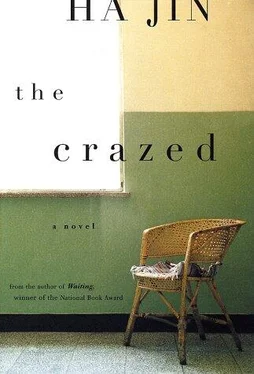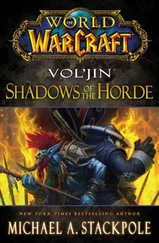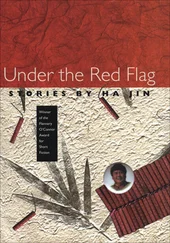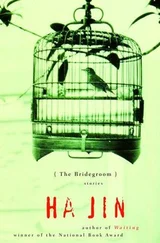I dared not take too many of my belongings, because I wanted to give the police the impression that I was still around so they would wait for me to return. I placed my pocket Japanese dictionary and an English grammar on the desk and kept them both opened with a bunch of keys and a stack of flash cards. With two changes of clothes, my Panda radio, and a few books in my shoulder bag, including an English dictionary, I walked out, leaving the door unlocked.
Quickly I pedaled north to Black Brook, a rural town about seven miles away to the east. The police must have been combing trains at the downtown station for local student leaders and for those who had fled Beijing, so I’d better go to a small town.
Biking on the dirt road that had almost no traffic, I thought about Yuman Tan’s visit. To me he used to be a mere toady, a flunky of Secretary Peng’s; but now he seemed a different man. Today he showed a modicum of decency and even some dignity. More than that, I must admit that he acted as a respectable man, capable of honorable feelings. What happened to him? What caused the change?
Weiya, of course. She must have given him some hope and happiness. Yes, he even looked younger today, despite the national tragedy on his mind. So it was happiness and love for a worthy woman that had brought some human decency out of him. How often we hear people say that suffering can purify one’s soul, ennoble one’s heart, and strengthen one’s moral fiber. How earnestly Mr. Yang had claimed on his sickbed, “I’m only afraid that I’m not worthy of my suffering!” Indeed, some great men and women are fortified and redeemed through their suffering, and they even seek sadness instead of happiness, just as van Gogh asserted, “Sorrow is better than joy,” and Balzac declared, “Suffering is one’s teacher.” But these dicta are suitable only for extraordinary souls, the select few. For ordinary people like us, too much suffering can only make us meaner, crazier, pettier, and more wretched. In Yuman Tan’s case, it was a little hope, happiness, and human warmth that made the seed of goodness sprout.
My thoughts turned to Secretary Peng. Why had she moved so swiftly to have me arrested? There were many more important “counterrevolutionaries” in this city; why would the police come for me in such a hurry? It flashed through my mind that Ying Peng must have been determined to get rid of me once and for all, and that she wanted to do this mainly for personal reasons. Although Vice Principal Huang’s son was carrying on with Meimei, there was still a slight possibility that someday I might go to Beijing and rekindle the old flame in her heart. She couldn’t leave for France with that man, who was going to the Sorbonne in the fall just for a year or two. Even if he decided to stay abroad afterward, legally she wouldn’t be allowed to join him until he married her and made the amount of francs required for getting the visa for her. In other words, there would be a period of physical separation between them, so I would have time to step in to reclaim my fiancée. Ying Peng must have been aware of that possibility and knew I was in high dudgeon against her, so she had resolved to root me out now to forestall the trouble down the road. Probably Vice Principal Huang was involved in this scheme too.
This realization made me see how essential personal motives were in political activities. Just as I rushed to Beijing to demonstrate my bravado to Meimei, in the name of revolution people acted on the basis of all kinds of personal interests and reasons. But our history books on the Communist revolution have always left out individuals’ motives. I remembered that when talking about why they joined the Red Army or the Communist Party, older revolutionaries had often said it was because they had wanted to escape an arranged marriage or to avoid debts or just to have enough food and clothes. It’s personal interests that motivate the individual and therefore generate the dynamics of history.
In retrospect, Secretary Peng wasn’t totally wrong about me. I indeed acted like a counterrevolutionary: I aspired not only to show my bravery to Meimei but also, like a free man capable of choice, to dislodge myself from the revolutionary machine. By so doing, I defied a prescribed fate like my teacher’s.
An hour later I arrived at Black Brook. Having little money on me, I couldn’t buy a train ticket for Guangzhou. It occurred to me that the only way to get some cash was to sell my Phoenix bicycle, which was still pretty new. Two years ago I had paid 196 yuan for it, so it was worth at least a hundred now. I walked along the clothing and food stands on the sidewalk of a wide street and asked a few people whether they wanted to buy my bicycle. Nobody was interested.
Finally at a fruit stand I offered it to an old vendor, who looked at it with a curious smirk. Hungry and thirsty, I could hardly take my eyes off the pile of apricots on a trestle table; my mouth was salivating, but I suppressed my craving and focused on selling him my bicycle. Asked again, he shook his gray head and kept waving his palm-leaf fan, though it wasn’t hot at all. Then he gave me a peculiar smile, which seemed to insinuate that he had the cash but suspected the goods were ill-gotten.
I was desperate and pleaded, “Uncle, have pity! My sister is dying in Tianjin and I have to be there as soon as possible. But I don’t have the money for the train fare. Come, take this bike. It’s as sturdy as a mule.”
He chased away a few bluebottles with his fan and shook his bullet-shaped head again.
“You think I’m a thief?” I pressed on.
He squinted at me, waggling his long eyebrows and clattering his carious teeth.
“You really think I’m a thief? Look, I’m a graduate student.” I took my picture ID out of my trouser pocket and showed it to him. “See the big seal here? Absolutely the real thing.”
He looked at the photo, then at me. “Seventy yuan,” he said dryly, and blew his nose onto the ground with his thumb pressing his nostril.
“Plus some apricots,” I responded, having no time to haggle for more.
He grinned, stood up, folded a piece of straw paper into a triangular bag, and put some apricots into it. “Here you are,” he said.
I accepted the fruit. Then he handed me twelve fivers and ten greasy singles. Having given him the bicycle key, I left without delay. In the one-room train station I bought a ticket for Nanjing, where I would switch to an express bound for Guangzhou. I planned to sneak across the border into Hong Kong, though I didn’t know how to do it exactly, unfamiliar with the terrain there. The photo of the woman attacked by a shark, which I had seen in the newspaper in Mr. Yang’s sickroom a month ago, came to mind, but I was not daunted. If need be, I would attempt to swim across the shark-infested water. I was a good swimmer and with luck should be able to make it. From Hong Kong I would go to another country— Canada, or the United States, or Australia, or some place in Southeast Asia where Chinese is widely used.
The train wouldn’t come for two hours. I walked east for about a hundred yards and found a quiet spot behind a stack of used ties. On one of them, a pair of rusted spikes still held a loosened plate. Lifting my eyes, I saw that the sidings and the main tracks all had ties made of concrete now, so these pieces of timber here must have become obsolete. In the distance two sets of shiny rails curved away and disappeared beyond a patch of young aspens. The air smelled of pungent asphalt oozing from the ties behind me. I sat down on a cinder block and began to eat the apricots, most of which were raw and sour; the only two sweet ones were wormy with deep holes in them. I couldn’t stop sucking my breath. I knew I had been taken in. The old fruit seller must purposely have picked some unsalable apricots for me; otherwise he wouldn’t have given them to me so willingly.
Читать дальше

![Lao Zi - Dao De Jing [Tao Te Ching] (english)](/books/3890/lao-zi-dao-de-jing-tao-te-ching-english-thumb.webp)
![Lao Zi - Dao De Jing [Tao Te Ching] (chinese)](/books/3891/lao-zi-dao-de-jing-tao-te-ching-chinese-thumb.webp)
![Lao Zi - Dao De Jing [Tao Te Ching] (espanol)](/books/3892/lao-zi-dao-de-jing-tao-te-ching-espanol-thumb.webp)







